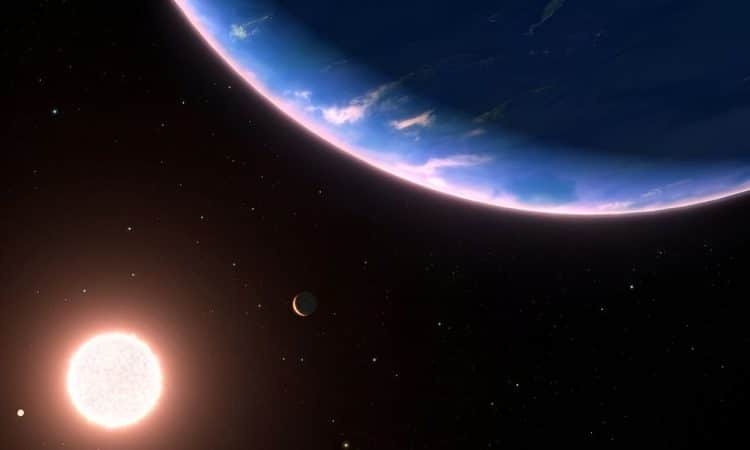New details about a “steamy” planet in the constellation Pisces, discovered with the Webb Telescope

An international study led by Canadians has revealed new information about the atmosphere of the planet GJ 9827 d – an exoplanet orbiting the star GJ 9827 in the constellation Pisces, about 98 light-years from Earth – using the James Webb Space Telescope (JWST).
The study found that the planet’s atmosphere contains a high concentration of heavier molecules, including a significant amount of water vapor, leading astronomers to believe that it could very well be a “steam world.”
Published in, the study was led by Caroline Piaulet-Ghorayeb, a PhD student at the University of Montreal’s Trottier Institute for Exoplanet Research (IREx), in collaboration with researchers from around the world.
Earlier this year, using data from the Hubble Space Telescope (HST), IREx researchers announced that they had detected water in the atmosphere of the planet GJ 9827 d, making it, at about twice the size of Earth, the smallest exoplanet with a confirmed atmosphere.
Together, these significant discoveries open new avenues for the search for life beyond the Solar System and improve our understanding of planetary formation and composition.
For years, scientists have focused on detecting atmospheres and mini-Neptunes—planets much larger than Earth and with hydrogen-dominated atmospheres, such as Jupiter and Neptune. But until now, detecting the atmospheres around smaller, closer-to-Earth-sized planets has remained an elusive goal.
The planet’s atmosphere contains a high concentration of heavier molecules
“At the moment, all the planets we’ve detected that have atmospheres are giant planets or, at best, mini-Neptunes,” said Piaulet-Ghorayeb, lead author of the study. “These planets have atmospheres made up mainly of hydrogen, making them more similar to the gas giants of the Solar System than to terrestrial planets like Earth, which have atmospheres dominated by heavier elements.”
By combining JWST/NIRISS and HST data, Piaulet-Ghorayeb showed that, unlike the hydrogen-dominated atmospheres of the larger planets, that of GJ 9827 d is rich in heavier molecules, with quite
This discovery marks the first robust detection of an exoplanet atmosphere where hydrogen is not the dominant component, instead suggesting a heavier, water-rich atmosphere.
“The molecular weight is closer to that of the carbon dioxide- or nitrogen-rich atmospheres we are currently looking for on smaller rocky planets, where we will eventually look for life,” Piaulet-Ghorayeb said, according to
She and her team made the observations using the Canadian instrument on Webb, the Near-Infrared Imager and Slitless Spectrograph (NIRISS). Using transmission spectroscopy, they analyzed the starlight passing through the planet’s atmosphere as it transited its host star, GJ 9827.
A major advance in the search for habitable environments
They then combined the new JWST observations with earlier HST observations to demonstrate with confidence that the observed spectral features are in fact caused by the planet’s atmosphere and not contamination from the system’s star.
With the help of the JWST/NIRISS SOSS data, scientists can finally distinguish between two types of atmospheres for the planet: one is cloudy, with few heavier elements, mainly hydrogen, with water present only in trace amounts; the other is high density with many heavier elements and lots of water.
Because GJ 9827 d is close to its star, its atmosphere is likely a mixture of gas and a superheated, dense state, rather than having distinct layers or clouds. Although GJ 9827 d itself is not considered habitable due to its proximity to the host star and the resulting high surface temperatures (about 350°C), the discovery represents a major advance in the search for habitable environments.
rich in water, on a small planet like GJ 9827 d is a proof of concept that such atmospheres exist and can be studied with the precision of JWST.
And this ultimately makes the prospect of finding habitable Earth-like planets more plausible.

